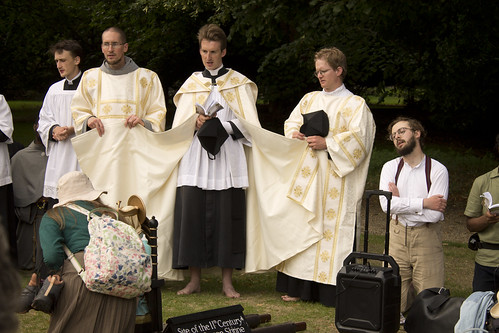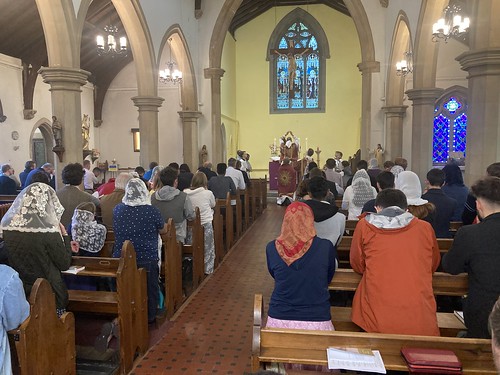Chairman's Blog
Protestant Traditionalists: Letters in The Tablet
 |
| LMS Walking Pilgrimage to Walsingham this year |
Indifferentism and Praying for the Queen and the King
 |
| Cardinal Bernard Griffin, centre |
Launch of Family & Life Academy
I am pleased to announce the launch of a new online learning opportunity in which I am involved: the Family and Life Academy, a project of
Voice of the Family.
Some readers may know Voice of the Family through their magazine Calx Mariae.
The Academy lets you watch courses of weekly lectures at a very affordable price, either live or recorded, plus free webinars on various subjects. There are courses on Natural Law (from me), Divine Law (from Fr Thomas Crean), the moral issue of abortion (from the veteran pro-life activist John Smeaton). There will be special appearances by His Excellency Eduard von Habsburg and Roberto Mattei.
Here is their announcement with more details and links.
We are delighted to announce that enrolment is now open for Voice of the Family’s new online learning platform, the Family and Life Academy: dedicated to providing authentic Catholic formation in an extensive range of subjects relating to the defence of life and the family in today’s world. Visit www.familyandlifeacademy.com to explore our programme for the coming months and sign up for updates on the curriculum and important online events.
Starting in October, the Family and Life Academy will provide comprehensive courses and free webinars in a live virtual classroom, with academics and other educators handpicked for their specific expertise. Every live lesson and webinar is followed by a Q&A, in which all participants are invited to participate. A video of each session will be available on demand from the next day.
We are honoured that His Excellency Eduard Habsburg will open the Family and Life Academy’s programme on 7 October with a webinar on Blessed Karl and Empress Zita of Austria. This intimate look at the lives of two saintly heads of state in the twentieth century provides an insight into their holy marriage and heroic sacrifice, the action of the Holy Ghost in the fulfilment of their duties of state, and why Blessed Karl and Servant of God Zita are a perfect model for families and for whole nations.
From Tuesday 11 October, Dr Joseph Shaw will teach a six-week course on natural law, going back to its roots in ancient Greek and Roman philosophy, taking us through its development in Christian thought, up to its definitive formulation by St Thomas Aquinas in the thirteenth century. Dr Shaw will also look at some of the moral theories which took its place in the eighteenth century, and their consequences for morality today. This in-depth course will give a step-by-step plan of the moral law written on the human heart, and present the case for returning to the solid ground of the natural law tradition, in order to respond to contemporary challenges.
Click here to see all the Family and Life Academy’s upcoming courses and free webinars
From Thursday 13 October, John Smeaton will teach a six-week course on abortion. He will be joined by Dr Greg Pike, who will begin the course with an authoritative overview of the scientific evidence regarding the development of life before birth, compiled from some of the best peer-reviewed studies in recent decades. Then John Smeaton, drawing on five decades of experience on the frontline of the battle against legalised abortion, will explore the spiritual aspects of the fight, take a closer look at the key figures, events and cultural forces which have shaped it, and consider the role which the Catholic laity has played in the defence of the unborn, and the responsibility of the Catholic hierarchy in leading it to ultimate victory, and to the triumph of the Immaculate Heart of Mary.
We are pleased to be joined by Professor Roberto de Mattei on 18 November, when he will present a webinar giving a historical overview of the revolutionary attacks against the family, from the fifteenth century to our own day. The next day, on 19 November, Dr Alan Fimister will start a five-week course on the role of parents as the primary educators of their children, while Fr Thomas Crean OP will teach a six-week course on divine law from 24 November.
Click here to see some of the Academy’s teachers
Catholic parents today face the huge challenge of raising their children at a time when educational institutions fail to foster serious moral formation. Furthermore, many in authority in the Church appear to have abandoned their clear teaching voice, leaving the faithful without firm moral support. Catholic families, deprived of essential help, often lack the tools necessary to carry out their God-given mission to educate the new generation of Catholics.
The deep crisis in the Church and in the world today can only be overcome by a renewed commitment to our Catholic faith. The curriculum of the Family and Life Academy has been designed with a view to providing young people, parents, pro-life and pro-family advocates and all the faithful with the tools necessary to develop their understanding of life and family issues in the light of the unchanging teaching of the Church; and, ultimately, to know and love better “the victory which overcometh the world, our faith” (1 Jn 5:4).
The last seventy years have seen unparalleled moral confusion in society, and confusion in the Church on an even deeper level. We at Voice of the Family believe that Catholics must lead the way in restoring moral order in society, which means recovering the spirit of prayer and a deeper understanding of the Church’s moral teaching. By helping the faithful to grasp the contemporary relevance of critical moral principles handed down by the Church, we hope to rebuild a culture in which our Catholic faith is not only believed but lived.
We look forward to embarking on this new apostolate and ask your continued help and prayers for our work in restoring traditional Catholic teaching, “to re-establish all things in Christ” (Eph 1:10).
Watch a short video trailer here.
King and Father as Sacred Offices: from the European Conservative
Here is another piece (links to the other two) I have written on the monarchy, which was published in the European Conservative on the occasion of Queen Elizabeth's Jubilee. It was in the print edition but is just now available online.
Perhaps the Queen’s most remarkable achievement is that, by accepting this [her role] so absolutely, she has gained a deeper fulfilment than if she had rebelled. She has become what she has tried to be. People who know her well say there is always an air of peace surrounding her. To use a phrase below the level of events, she has job satisfaction.
Read the whole thing there.
Two pieces on the Monarchy
 |
| Queen Elizabeth II at her coronation in 1953 |
I have written two pieces on the British Monarchy for US-based sites: Catholic Answers and 1Peter 5. I think a lot of Americans find it difficult to get their heads round the monarchy, even conservative Catholics.
Latin Mass Society: new office!
Our new address is:
Website, email, and phone number all remain the same.
Our archives reveal, the Society first rented an office on Blandford Street, Marylebone west London, above what is now a restaurant. Prior to that the postal address was 159 Montague Mansions, London W1. In 1981, the Society moved to Cork Street and, in 1991, to an office in Corpus Christi Church, Maiden Lane. Two years later, in 1993, we leased our first office in Lupus House, 11-13 Macklin Street before moving to our present, larger, office sometime later.
Our move to 9 Mallow Street, London EC1Y 8RQ has now taken place. As we have been closed for two weeks, it will take the staff sometime to catch up with adminstration, processing shop order etc. We thank you for your continued patience and understanding.
Prayer for King Charles, after Sunday Traditional Mass
In England and Wales, after the principle Mass on Sunday, we say a Prayer for the Sovereign. The prayer dates back to the 15th century and is used around the world for Catholic monarchs, and a version has even been used for republics where there has been a Concordat with the Pope. The Bishops of England and Wales must have sought and recieved permission to use it for the British sovereign, to emphasis their loyalty; it has been used here since 1850.
V. Dómine salvum fac Regem nostrum Carolus.
R. Et exáudi nos in die, qua invocavérimus te.
Oremus.
Quǽsumus, omnípotens Deus, ut fámulus tuus Carolus, Rex noster, quæ tua miseratióne suscépit regni gubernácula, virtútum étiam ómnium percípiat increméntum; quibus decénter ornátus et vitiórum monstra devitáre, [in time of war: hostes superáre,] et ad te qui via, véritas, et vita es, cum regina consorte et prole régia gratiósus valeat perveníre. Per Christum Dóminum nostrum.
R: Amen.
V. O Lord, save Charles our King
All: and hear us in the day that we shall call upon thee.
Let us pray.
We beseech thee, almighty God, that thy servant Charles our King, who through thy mercy has undertaken the government of this realm, may also receive an increase of all virtues. Fittingly adorned with these, may he be able to shun all evildoing, [in time of war: to vanquish his enemies,] and, together with the Queen consort and the royal family, to come by thy grace unto thee who art the way, the truth, and the life. Through Christ our Lord.
R: Amen.
This is a jpeg of three different Chant settings of the antiphon: there are also polyponic settings. The first given here is the most commonly used one.
No, the answer is not 1965, Fr Somerville-Knapman
Cardinal Roche seems to require that the Church deny herself, and to employ her authority today to negate her authority in former days. Many will echo Benedict XVI in asking how what was holy yesterday—and indeed for preceding centuries—can suddenly be a danger to faith and the Church today. Rome is making a serious mistake in its programme to shore up the practical reception of the reformed liturgy, and in so doing is backing itself into a corner.
The liturgical reforms were expressly pastoral, intended to increase congregational participation. The severe decline in the numbers in congregations since the promulgation of the reformed liturgy over 50 years ago suggests that the reforms have not achieved their purpose. Equating the reformed liturgy—which I celebrate, but which for all its virtues has failed in its purpose—with the will of Vatican II leads logically to the conclusion that the failure is the Council’s when in fact it is the Consilium’s.
... in restricting the legitimate expression of the Roman rite to “the liturgical books promulgated by Paul VI and John Paul II” Rome has allowed some room for manoeuvre, and for saving face. The Ordo Missae of 1965 is a post-conciliar reform promulgated by Paul VI which correlates very closely to the conciliar decrees in adapting the old rite more organically to their expanded liturgical vision. It offers a basis for revisiting the reforms that have so patently failed in their purpose, a failure that restrictive legislation will not hide, but only further expose.
Fr Gwilym Evans FSSP: Mass in Cardiff 17th Sept
LMS Walsingham Pilgrimage: photos
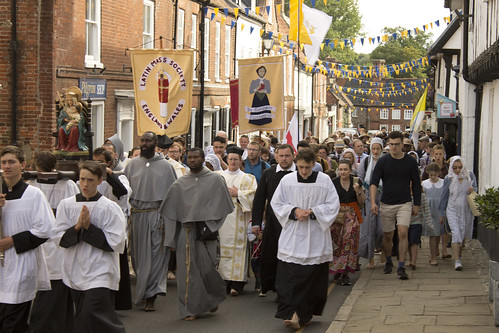 |
| Approaching the Priory grounds at the end of the Holy Mile. |
 |
| Mass in Cambridge on Thursday morning for the three pilgrims trying out an extra leg of the walk: another 18.4 miles, to Ely |
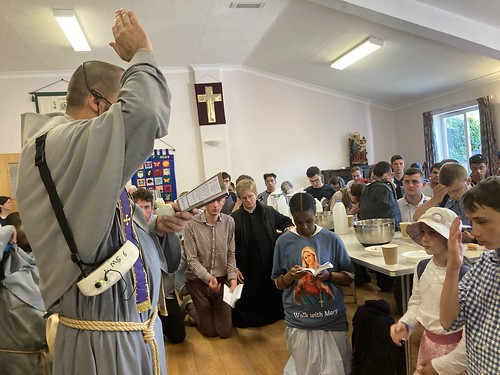 |
| Pilgrims' blessing from Fr Serafino Lanzetta. |
 |
| On the road by the Great Ouse. |
The chapel at Oxborough is undergoing repairs and the lovely reredos is covering in a dust sheet.
 |
| In the Reconciliation Chapel at the Catholic Shrine on Sunday. |
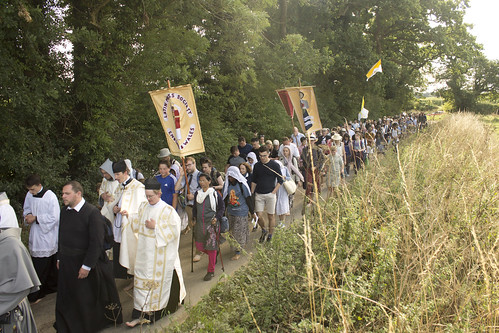 |
| The Holy Mile from the shrine to the site of the Holy House in the Priory ruins |
 |
| In the Priory grounds |
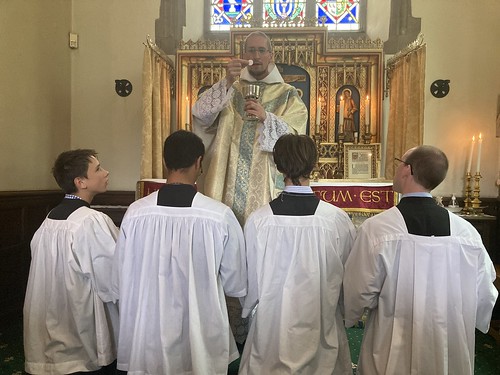 |
| Mass on Monday for those who had stayed overnight. |
 |
| An expanded cooking and support driving team rose magnificently to the occasion! |
Support the Latin Mass Society









